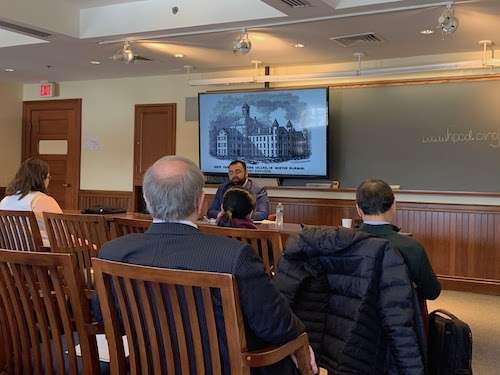Our Work
Ari Ne’eman speaks at HPOD
A chapter from his forthcoming book on the history of disability in America
On Tuesday, February 19th, Ari Ne’eman joined the Harvard Law School Project on Disability to present on a chapter from his forthcoming book on the history of disability in America. In his introduction of Ne’eman, Professor Michael Stein lauded Ne'eman’s enduring advocacy for disability rights. Ne’eman is the founder of the Autistic Self-Advocacy Network, a nonprofit organization that seeks to empower individuals with autism to advocate for equal rights, access, and opportunities. From 2010 to 2015, Ne’eman served as a President Obama appointee to the National Council on Disability. Among several other disability advocacy positions, Ne’eman currently works as chief executive officer of MySupport.com, an online platform that connects individuals with disabilities and seniors to support workers.
Ne’eman’s talk centered around the history of the modern mental health movement, and discussed how the 20th century eugenics movement overtook and distorted intended positive reforms to mental institutions.
Ne’eman detailed the life of Clifford Whittingham Beers, who was a founding figure of the modern mental health movement. He said that Beers’ impetus to seek reform within mental institutions stemmed from his own period of institutionalization, during which he experienced extreme maltreatment. Beers vowed to launch a mass movement, seeking better conditions for those declared legally insane and subjected to the fates of insane asylums.
According to Ne’eman, once Beers was released, he set out to accomplish these ambitious goals. He wrote an autobiography, A Mind that Found Itself, in which he revealed to the public his own experiences with psychosis and the brutal treatment he received in a series of mental hospitals. Eventually swayed by the ideas of leading psychiatrist Andrew Meyers, Beers founded the Connecticut Society for Mental Hygiene in 1908, and launched the National Committee for Mental Hygiene in 1909.
However, despite initial well-meaning intentions, the organizations that Beers’ created eventually grew to cause tremendous harm, because of their entanglement with the rising eugenics movement. Notably, the National Committee for Mental Hygiene began to promote institutionalization for people with intellectual disability– what was then referred to as “mental deficiency” or “feeblemindedness”. Further, the motive for institutionalization was not to increase service provision to the “mentally deficient”, but rather to prevent these “defective people” from “propagating their kind”.
Institutionalization and sterilization of individuals with intellectual disability became increasingly popular, due to the hopes of “rooting out disability” from society. In his talk, Ne’eman emphasized that the ultimate and tragic result of this history was that the very organization that Beers founded to reform mental institutions became corrupted for the purpose of establishing more of these institutions – leading to an array of negative impacts that are still salient today.



